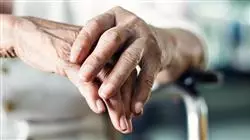University certificate
The world's largest faculty of medicine”
Introduction to the Program
At TECH you will broaden your knowledge in geriatric psychopharmacology from experts in the sector with an impeccable academic background"

Often, physicians working with geriatric patients demand qualifications that delve deeper into their behaviors and conditions. Both physically and psychologically. At present, there is a scarce educational offer on the study of the brain in the elderly. It also focuses specifically on palliative strategies for the sequelae or side effects of psychiatric illness. And that in many cases it has become outdated.
Therefore, from TECH we propose a degree that serves as a guided intervention to the functioning of the brain from the age of 65. Its objective is not so much a palliative treatment, but to completely eliminate suffering in those cases where it is feasible. Always, through the most innovative drugs and psychotherapies.
In this sense, the program is based on a general vision of disease and health in old age. As well as changes in personality and the rPsychogeriatrics ole of the family in the development and stability of the elderly, to later focus on physiological and neuropsychological changes, intervention from clinical psychology and pharmacological treatment.
In addition, as it is taught in a 100% online mode, the doctor will be able to combine the study of this Professional master’s degree with the rest of their daily obligations. Choosing at all times where and when to carry out the learning process.
This program delves into the most innovative psychotherapies to keep you up to date with the latest advances in the field”
This Professional master’s degree in Psychogeriatrics contains the most complete and up-to-date scientific program on the market. The most important features include:
- The development of case studies presented by experts in Psychogeriatrics
- The graphic, schematic, and eminently practical contents with which they are created, provide scientific and practical information on the disciplines that are essential for professional practice
- Practical exercises where self-assessment can be used to improve learning
- Its special emphasis on innovative methodologies
- Theoretical lessons, questions to the expert, debate forums on controversial topics, and individual reflection assignments
- Content that is accessible from any fixed or portable device with an Internet connection
Increased life expectancy is impacting the features of aging that affect drug intervention. The faculty of this degree will show you what changes are taking place"
The program includes, in its teaching staff, professionals in the field of Psychogeriatrics who bring to this training the experience of their work, in addition to recognized specialists from prestigious reference centers and universities.
The multimedia content, developed with the latest educational technology, will provide the professional with situated and contextual learning, i.e., a simulated environment that will provide immersive training programmed to train in real situations.
This program is designed around Problem Based Learning, whereby the professional must try to solve the different professional practice situations that arise during the academic year. For this purpose, the student will be assisted by an innovative interactive video system created by renowned and experienced experts.
Enroll in TECH and familiarize yourself with the different types of conflicts and models that explain and models that explain health and disease behaviors

This Professional master’s degree details the most innovative pharmacological treatments for emotional disorders such as depression or anxiety"
Why study at TECH?
TECH is the world’s largest online university. With an impressive catalog of more than 14,000 university programs available in 11 languages, it is positioned as a leader in employability, with a 99% job placement rate. In addition, it relies on an enormous faculty of more than 6,000 professors of the highest international renown.

Study at the world's largest online university and guarantee your professional success. The future starts at TECH”
The world’s best online university according to FORBES
The prestigious Forbes magazine, specialized in business and finance, has highlighted TECH as “the world's best online university” This is what they have recently stated in an article in their digital edition in which they echo the success story of this institution, “thanks to the academic offer it provides, the selection of its teaching staff, and an innovative learning method aimed at educating the professionals of the future”
A revolutionary study method, a cutting-edge faculty and a practical focus: the key to TECH's success.
The most complete study plans on the university scene
TECH offers the most complete study plans on the university scene, with syllabuses that cover fundamental concepts and, at the same time, the main scientific advances in their specific scientific areas. In addition, these programs are continuously being updated to guarantee students the academic vanguard and the most in-demand professional skills. In this way, the university's qualifications provide its graduates with a significant advantage to propel their careers to success.
TECH offers the most comprehensive and intensive study plans on the current university scene.
A world-class teaching staff
TECH's teaching staff is made up of more than 6,000 professors with the highest international recognition. Professors, researchers and top executives of multinational companies, including Isaiah Covington, performance coach of the Boston Celtics; Magda Romanska, principal investigator at Harvard MetaLAB; Ignacio Wistumba, chairman of the department of translational molecular pathology at MD Anderson Cancer Center; and D.W. Pine, creative director of TIME magazine, among others.
Internationally renowned experts, specialized in different branches of Health, Technology, Communication and Business, form part of the TECH faculty.
A unique learning method
TECH is the first university to use Relearning in all its programs. It is the best online learning methodology, accredited with international teaching quality certifications, provided by prestigious educational agencies. In addition, this disruptive educational model is complemented with the “Case Method”, thereby setting up a unique online teaching strategy. Innovative teaching resources are also implemented, including detailed videos, infographics and interactive summaries.
TECH combines Relearning and the Case Method in all its university programs to guarantee excellent theoretical and practical learning, studying whenever and wherever you want.
The world's largest online university
TECH is the world’s largest online university. We are the largest educational institution, with the best and widest online educational catalog, one hundred percent online and covering the vast majority of areas of knowledge. We offer a large selection of our own degrees and accredited online undergraduate and postgraduate degrees. In total, more than 14,000 university degrees, in eleven different languages, make us the largest educational largest in the world.
TECH has the world's most extensive catalog of academic and official programs, available in more than 11 languages.
Google Premier Partner
The American technology giant has awarded TECH the Google Google Premier Partner badge. This award, which is only available to 3% of the world's companies, highlights the efficient, flexible and tailored experience that this university provides to students. The recognition as a Google Premier Partner not only accredits the maximum rigor, performance and investment in TECH's digital infrastructures, but also places this university as one of the world's leading technology companies.
Google has positioned TECH in the top 3% of the world's most important technology companies by awarding it its Google Premier Partner badge.
The official online university of the NBA
TECH is the official online university of the NBA. Thanks to our agreement with the biggest league in basketball, we offer our students exclusive university programs, as well as a wide variety of educational resources focused on the business of the league and other areas of the sports industry. Each program is made up of a uniquely designed syllabus and features exceptional guest hosts: professionals with a distinguished sports background who will offer their expertise on the most relevant topics.
TECH has been selected by the NBA, the world's top basketball league, as its official online university.
The top-rated university by its students
Students have positioned TECH as the world's top-rated university on the main review websites, with a highest rating of 4.9 out of 5, obtained from more than 1,000 reviews. These results consolidate TECH as the benchmark university institution at an international level, reflecting the excellence and positive impact of its educational model.” reflecting the excellence and positive impact of its educational model.”
TECH is the world’s top-rated university by its students.
Leaders in employability
TECH has managed to become the leading university in employability. 99% of its students obtain jobs in the academic field they have studied, within one year of completing any of the university's programs. A similar number achieve immediate career enhancement. All this thanks to a study methodology that bases its effectiveness on the acquisition of practical skills, which are absolutely necessary for professional development.
99% of TECH graduates find a job within a year of completing their studies.
Professional Master's Degree in Psychogeriatrics
At TECH Global University, we are concerned about providing quality and accessible education to anyone who wishes to specialize in the comprehensive care of the elderly. For this reason, we have created our Professional Master's Degree in Psychogeriatrics, in which you will be able to train as a highly qualified professional in the management of the psychological, emotional, social and physical aspects that affect the elderly. Our online classes offer a wide variety of benefits for our students, such as the flexibility to adapt to any schedule, the convenience of studying from anywhere and the ability to review class content at any time. In addition, our highly trained professors specialized in the field of psychogeriatrics will provide you with the guidance and support you need to achieve your academic and professional goals.
Study psychogeriatrics at the world's largest School of Medicine
Do you know why TECH is considered one of the best universities in the world? Because we have a catalog of more than ten thousand academic programs, presence in multiple countries, innovative methodologies, unique academic technology and a highly qualified teaching staff; that's why you can't miss the opportunity to study with us. In this academic program, you will delve into the knowledge related to aging, cognitive and mental disorders that affect the elderly, as well as techniques and strategies to prevent and treat these pathologies. You will also acquire skills to design and implement comprehensive care plans that promote the quality of life of older adults, taking into account the physical, emotional and social aspects that influence their well-being. In short, if you want to specialize in the care of the elderly and acquire skills that allow you to provide comprehensive and quality care, our Professional Master's Degree in Psychogeriatrics is the best option. Do not hesitate to join TECH and be part of the most qualified and competent professionals in the field of geriatric care, enroll now!







